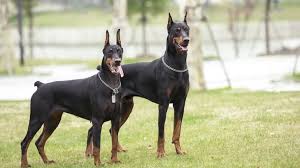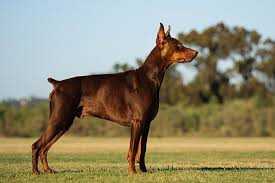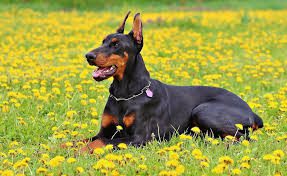The Doberman Pinscher, often simply referred to as the Doberman, is a large, athletic, and intelligent dog breed that is widely recognized for its sleek appearance and imposing presence. Originally bred in Germany in the late 19th century, the Doberman Pinscher has become a popular breed around the world due to its loyalty, trainability, and protective nature.
One of the most distinctive features of the Doberman Pinscher is its coat, which is typically short, smooth, and glossy. The coat comes in a variety of colors, including black, red, blue, and fawn, and often features distinctive markings on the face, chest, and legs. The breed’s build is muscular and athletic, with a deep chest, strong legs, and a long, powerful neck that gives it a commanding presence.
Despite its formidable appearance, the Doberman Pinscher is a highly trainable and obedient breed that makes an excellent companion for those who are willing to provide it with plenty of love, attention, and exercise. Because of their high energy levels, Dobermans require plenty of daily exercise and mental stimulation to keep them happy and healthy. This can include long walks, runs, and hikes, as well as games and activities that challenge their minds.
While the Doberman Pinscher is generally known for its loyalty and affection towards its owners, the breed also has a reputation for being protective and territorial. This means that early socialization and training are essential to ensure that Dobermans are well-behaved around strangers and other animals. With proper training, however, Dobermans can become well-adjusted and well-behaved members of the family.
One of the most important things to consider when bringing a Doberman Pinscher into your home is the breed’s potential health issues. Like many large breeds, Dobermans are prone to certain health conditions, including hip dysplasia, von Willebrand’s disease, and dilated cardiomyopathy. To minimize the risk of these and other health problems, it is important to work with a reputable breeder who screens their dogs for genetic disorders and who provides proper veterinary care throughout the dog’s life.
Overall, the Doberman Pinscher is a highly intelligent, loyal, and athletic breed that makes an excellent companion for those who are willing to provide it with the love, attention, and exercise it requires. While they may not be the best choice for first-time dog owners or those with small children, Dobermans can make wonderful pets for those who are willing to invest the time and effort required to train and care for them properly.
Read Also: All you need to know about the Basenji Dog
History and Origin of Doberman Pinscher Dogs

The Doberman Pinscher is a relatively new breed that was first developed in the late 19th century in Germany by a man named Louis Dobermann. Dobermann was a tax collector who also served as the dog catcher in his town. He wanted to create a dog that could protect him while he was collecting taxes and also serve as a loyal companion.
To create the breed, Dobermann bred a number of different dog breeds, including the German Pinscher, Rottweiler, Beauceron, and Greyhound. The result was a dog that was strong, agile, intelligent, and fiercely loyal.
The breed was initially known as the Dobermann Pinscher, but the “n” was later dropped to create the name that is used today. The first Doberman Pinschers were imported to the United States in the early 1900s, and the breed quickly gained popularity as a police and military dog.
During World War II, the Doberman Pinscher was used extensively by the United States Marine Corps as a war dog. These dogs were trained to work as sentries, messengers, scouts, and attack dogs, and they played a vital role in helping to win the war.
In the years following World War II, the Doberman Pinscher became increasingly popular as a family pet and companion dog. Today, the breed is recognized by the American Kennel Club and is one of the most popular dog breeds in the United States and around the world.
Despite its popularity, the Doberman Pinscher has also been the subject of controversy over the years due to its reputation as a “dangerous” breed. However, this reputation is largely unfounded, as most Dobermans are well-behaved and loving pets when properly trained and socialized.
Health Issues and Lifespan of Doberman Pinscher Dogs

One of the most common health issues seen in Dobermans is hip dysplasia, which is a genetic condition that affects the hip joints. This condition can lead to arthritis and lameness if left untreated. To reduce the risk of hip dysplasia, it is important to work with a reputable breeder who screens their dogs for this condition.
Another health issue that is common in Dobermans is dilated cardiomyopathy, which is a condition that affects the heart muscle. This condition can cause the heart to enlarge and weaken, leading to heart failure if left untreated. Dilated cardiomyopathy is believed to be hereditary in Dobermans, and affected dogs should not be bred.
Other health issues that may affect Dobermans include von Willebrand’s disease, which is a blood clotting disorder, hypothyroidism, which is a condition that affects the thyroid gland, and gastric torsion, which is a condition where the stomach twists on itself. Dobermans may also be prone to certain types of cancer, including lymphoma and osteosarcoma.
The average lifespan of a Doberman Pinscher is between 10 and 13 years. However, with proper care and management, some Dobermans may live well into their teens. To promote a long and healthy life for your Doberman, it is important to provide them with a nutritious diet, regular exercise, and routine veterinary care.
Regular check-ups with your veterinarian can help detect any health issues early on, allowing for prompt treatment and management. Additionally, maintaining a healthy weight and providing your Doberman with plenty of mental and physical stimulation can help prevent obesity and other health problems associated with inactivity.
Overall, the Doberman Pinscher is a relatively healthy breed, but it is important to be aware of the potential health issues that may affect them. Working with a reputable breeder, providing regular veterinary care, and promoting a healthy lifestyle can help ensure that your Doberman lives a long and happy life.
Doberman Pinscher Dog Breed Complete Grooming and Care Guide

Brushing: The Doberman’s short, sleek coat requires minimal grooming, but it is still important to brush them regularly to remove loose hair and dirt. Use a soft-bristled brush to gently brush their coat in the direction of hair growth. Brushing also helps distribute natural oils throughout the coat, keeping it shiny and healthy.
Bathing: Bathe your Doberman as needed, usually every 2-3 months. Use a mild dog shampoo and warm water, being careful to avoid getting water in their ears. Rinse thoroughly and dry them off with a towel or a hairdryer on a low setting.
Nail Trimming: Trim your Doberman’s nails regularly, as long nails can cause discomfort and even lead to injury. Use a sharp, guillotine-style nail clipper to trim their nails, being careful not to cut the quick (the pink part of the nail that contains blood vessels).
Dental Care: Brush your Doberman’s teeth daily using a dog toothbrush and toothpaste. This helps prevent dental problems such as tartar buildup and gum disease. You can also provide them with dental chews or toys to help clean their teeth.
Ear Care: Clean your Doberman’s ears regularly to prevent ear infections. Use a cotton ball or soft cloth dampened with a gentle ear cleaner to wipe out any dirt or debris. Avoid using cotton swabs, as they can push debris deeper into the ear canal.
Exercise: The Doberman is a highly active breed that requires daily exercise to maintain their physical and mental health. Take them for daily walks, runs, or play sessions to provide them with the exercise and mental stimulation they need.
Training: The Doberman is a highly intelligent breed that responds well to positive reinforcement training. Start training your Doberman from a young age, using reward-based training methods to teach them basic obedience and good behavior.
Socialization: Proper socialization is important for all dogs, but especially for the Doberman, who can be prone to shyness or aggression if not properly socialized. Expose your Doberman to different people, animals, and environments from a young age to help them develop good social skills.
Health Check-ups: Take your Doberman for regular check-ups with a veterinarian to monitor their health and detect any potential health issues early on.
By following these grooming and care tips, you can ensure that your Doberman stays healthy, happy, and well-groomed. Remember to provide them with plenty of love, attention, and exercise, as the Doberman is a loyal and affectionate breed that thrives on human companionship.
Read Also: How to Hand-milk a Goat, follow these steps
Doberman Pinscher Puppies

Finding a reputable breeder: It is important to work with a reputable breeder who breeds for health, temperament, and conformation. Look for a breeder who health tests their dogs for genetic conditions and can provide you with documentation of these tests. Additionally, a good breeder should be willing to answer any questions you have and provide you with information on how to care for your new puppy.
Socialization: Socialization is critical for Doberman Pinscher puppies to develop good social skills and prevent future behavior problems. Expose your puppy to different people, animals, and environments from a young age to help them become well-adjusted adults.
Training: Training is also important for Doberman Pinscher puppies to learn basic obedience and good behavior. Start training your puppy from a young age using positive reinforcement methods such as treats, praise, and toys.
Vaccinations: Doberman Pinscher puppies require a series of vaccinations to protect them from common canine diseases. Your veterinarian can provide you with a vaccination schedule and advise you on when to bring your puppy in for vaccinations.
Feeding: Doberman Pinscher puppies require a balanced, nutritious diet to support their growth and development. Feed your puppy a high-quality puppy food that is formulated specifically for large breed puppies.
Exercise: Doberman Pinscher puppies are highly active and require plenty of exercise to burn off their energy. Take your puppy for daily walks, play sessions, and provide them with toys and activities to keep them entertained.
Grooming: While Doberman Pinscher puppies have short, sleek coats that require minimal grooming, it is still important to brush them regularly to remove loose hair and dirt. Additionally, trim your puppy’s nails regularly, clean their ears, and brush their teeth daily.
Remember, bringing a Doberman Pinscher puppy into your home is a big responsibility, but with proper care, training, and socialization, they can become loving, loyal companions.
Read Also: The Importance of a Laboratory in Science Education
